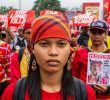After intense public pressure, the Arroyo administration released on Thursday the report of the Melo Commission, which was created to investigate the killings of political activists and journalists in the Philippines. In a nutshell, the report assigns accountability to state security forces for these atrocities.
Davao Today, which sourced the document from the Office of the Press Secretary, is publishing the report in full, but divided it by section and subsection for easy reading and navigation.
Important note: The sectioning and pagination of the report as published here is different from the actual document. The modification was done merely for ease of navigation in this site.
TABLE OF CONTENTS
I: INTRODUCTION
2. Procedure
II: UNDISPUTED FACTS
III: PRESENTATION OF WITNESSES/RESOURCE PERSONS
1. Task Force Usig; PNP Deputy Director Gen. Avelino I. Razon, Jr.
2. AFP Chief of Staff Gen. Hermogenes Esperon
2a. AFP investigation of Palparan
3. Maj. Gen. Jovito S. Palparan
3a. Gen. Palparan�s Statements implicating specific Party List Organizations
3b. Gen. Palparan�s view on the repeal of the Anti-Subversion Act
3c. Gen. Palparan’s Internal Territorial Defense System
3d. Collateral Damage; Civilians and Local Officials; Vigilante Killings
3e. On the killings of Mr. Eddie Gumanoy and Ms. Eden Marcellana
3f. Command Responsibility and CPP-NPA Purge Theory
4. Information from the Commission on Human Rights
5. Task Force Mapalad: farmers beneficiaries in Negros Occidental
7. Presentation of Media groups
IV: CASE STUDIES
V: FINDINGS
2. Agrarian Reform Related Killings
4a. Motive
4c. Reaction
4d. General Palparan
5. Command Responsibility defined
6. Command Responsibility as Binding Customary International Law
7. International and State Responsibility
VI: RECOMMENDATIONS
1. Political Will; Investigation
2. Prosecution; Protection of Witnesses; Special law for strict chain-of-command responsibility
3. Enhancement of investigative capabilities of the PNP and NBI
VII: CONCLUSION
[tags]davao today, human rights, extrajudicial killings, melo commission, philippines, philippine military, new people’s army, communism, gloria macapagal-arroyo[/tags]
Extrajudicial Killings, Melo Commission Report on Extrajudicial Killings









